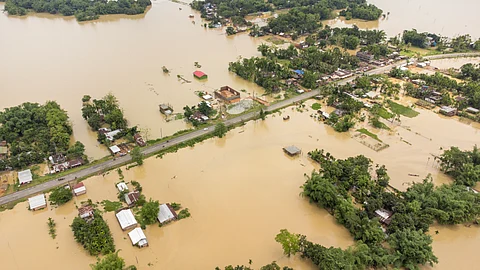

The Standing Committee on Finance, in a recent report tabled in both houses of the Parliament, has raised significant concerns regarding government policies on insurance, particularly the imposition of Goods and Services Tax (GST) and Tax Deducted at Source (TDS) on insurance products. As disasters and diseases increase, these policies are seen as counterproductive, potentially deterring people from accessing much-needed insurance coverage.
In its report, the committee reviewed the state of the insurance sector, highlighting growing needs and critical shortcomings. The report also indicated that the government policies favour private insurance companies over public-sector companies.
The report pointed out that the government levies 18 per cent GST on essential products such as health and term insurance, making premiums prohibitively expensive for many. At present, insurance rates are low even though hospitals are given many types of discounts on medical services and equipment.
In comparison, insurance products in developed regions like the European Union and Canada are exempt from VAT or GST, the committee noted
The Insurance Regulatory and Development Authority of India (IRDAI) had previously recommended to the Union Ministry of Finance that India adopt similar exemptions to make insurance more accessible. Despite this, there has been no clear roadmap from the Department of Financial Services under the ministry.
The Standing Committee expressed concern over this inaction, urging the finance ministry to take coordinated steps in consultation with the GST Council and the Revenue Department.
The committee criticised the government for creating a regulatory environment that disproportionately benefits private insurers. For instance, public sector companies are required to deduct 2 per cent TDS on commissions, claims or bonuses paid to insurance agents and policyholders (for amounts exceeding Rs 2.5 lakh), while private companies face no such obligations. Of this 2 per cent, a per cent is allocated to the central government and the other goes to the state.
The Standing Committee noted that the ministry’s response to these disparities lacked substance, calling for a detailed review to ensure fair treatment for both public and private insurers.
“The Committee find the reply of the Ministry ambiguous. It seems that the Ministry have not examined the matter as to how the anomaly in regard to treatment of Public and Private Sector be removed. Rather they have presented the factual positions. The Committee while reiterating their recommendation would like the Ministry to examine the matter and come up with the solutions to ensure fair parity for the two sectors,” the report stated.
The committee also emphasised the importance of holding private insurers accountable when implementing government schemes such as Ayushman Bharat and the Pradhan Mantri Fasal Bima Yojana, which public sector companies are required to implement but private companies are not.
The Prime Minister’s Crop Insurance Scheme benefited private companies while causing losses to public companies, Down To Earth previously reported. However, private companies that began incurring losses eventually withdrew from the scheme.
Public sector insurance companies are also grappling with significant financial losses, amounting to approximately Rs 26,000 crore between 2016-17 and 2020-21. The COVID-19 pandemic further exacerbated these challenges. While the government has infused Rs 17,000 crore in capital and pledged additional resources, the committee recommended a clear strategic roadmap with a fixed timeline to improve these companies’ financial health.
“This roadmap should have appropriate timelines for demonstrable performance improvement. If performance does not improve sufficiently quickly, there should be further aggressive measures that should be evaluated,” the committee said in the report.
India ranks third, after the United States and China, in the frequency of natural disasters since 1900, with floods causing the most damage. Natural disasters cause significant damage to infrastructure, and the country is particularly vulnerable due to its large population and diverse geographical features. Many homes in India are not resilient enough to withstand earthquakes or floods, the report pointed out.
The committee recommended that the government provide insurance for homes and properties, particularly in vulnerable areas and among economically weaker sections.
Drawing from the example of the US state of Florida, which is frequently hit by hurricanes, the committee suggested creating a specialised insurance programme for disaster-prone areas.
In its response, the Department of Financial Services told the committee that it is considering making home insurance mandatory in high-risk regions. The ministry also stated that a working group called the Committee on Disaster Risk Restructuring (CODRR) has been formed under the National Disaster Management Authority to strengthen the link between disaster-affected areas and the insurance industry.
A significant segment of the population, often referred to as the “missing middle,” is unable to benefit from schemes such as Ayushman Bharat or state government insurance programmes. This is because their income exceeds the threshold for the economically weaker sections but is insufficient to afford regular insurance premiums. As a result, they often have to cover hospital and medical expenses out of their monthly incomes.
Centre’s apex public policy think tank NITI Aayog had previously recommended extending insurance coverage to this demographic. The Standing Committee has reiterated this point, emphasising that as healthcare costs continue to rise due to inflation, concrete steps must be taken to include those currently excluded from insurance coverage.
“The Committee, considering that many people in the country are just one medical bill away from slipping into poverty, believe that insurance products with affordable premiums and cashless settlement facilities would be instrumental in encouraging more people to opt for health insurance,” the report stated.